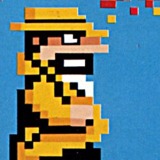The evolution of open world games and traffic
By bigsocrates 3 Comments
I recently completed two open world games at the opposite ends of the open end revolution, Jak II and L.A. Noire.
Jak II came out soon after Grand Theft Auto III ignited the 3D open world trend and many reviewers at the time said that the open world was shoehorned into the design. That's a little unfair; Jak and Daxter the Precursor Legacy was technically an open world in that you could travel from any point in it to any other by the end, and Jak II does have a fair number of missions in the big city hub area. On the other hand these missions were often both simplistic and not all that much fun, and it's clear the designers had not yet mastered open world design. It's very easy to get the attention of the super tenacious guards and moving around the city is made more difficult by pervasive traffic that clogs the upper lanes. Fast vehicles can often blow up with one hit against another vehicle, not a lot of fun when controls are floaty and races often require taking blind corners at high speeds.
L.A. Noire on the other hand was released somewhat recently by a publisher virtually synonymous with open world games, and uses its open world not so much for action (though there is that) but also for atmosphere and sense of place in what is a sprawling adventure game. Like Jak II there's not a lot to do in the world outside of missions (collect random stuff) and like Jak II the traffic is supremely annoying. Here it rarely interferes with the gameplay, except during car chases, but rather obstructs your travel from one place to another frequently leading to a choice between driving carefully over what can be very long in-game distances, or putting up with virtually unavoidable ranking and suspension of disbelief damaging crashes every so often even if the siren's blaring (the A.I's reaction to the siren leaves a lot to be desired.)
In both cases the traffic seems to exist primarily to create a sense of atmosphere, which is good, but has the effect of interfering with gameplay. In Jak II it interferes with both missions and traveling to get missions, which isn't fun, whereas in L.A. Noire it heavily encourages the use of fast travel, which defeats the purpose of having a sprawling open world. The huge world of L.A. Noire cost a lot of money to make, and the game brought down the studio that built it, so to create something so sprawling and then encourage players to skip seeing it seems like a very strange use of development resources.
Compare these games to Red Dead Redemption, another open world game but one that, because of its setting, has very little traffic and lots of areas to explore. Red Dead had fast travel too, but many people didn't use it much because the horse riding through the awesome setting was just fun. That's good design. If you're going to have an open world then navigating it should be fun for its own sake and fast travel should be reserved for spots where you want to take care of something in particular or you've played a ton and seen everything already. The Grand Theft Auto series manages this with fast, fun to drive cars, unrealistically wide streets that allow for maneuvering, and gripping police chases.
I come back to traffic because of all the things for game designers to import into an open world it seems an odd choice. Traffic is something we generally hate in our day to day lives, and while a certain amount of it does provide a sense of a living breathing world, a little can go a long way. In Jak II the traffic just serves to show how barren the world is, with everyone circling endlessly despite there being nowhere to actually go. In L.A. Noire it makes driving through the city a little too real. I don't remember scenes in great film noirs where people sat at traffic lights listening to the radio because they were pinned in. It could be solved by putting stuff closer together (especially those damned street crimes, which were often on the other side of the city from the areas you were investigated) but the partner drive function just seems to be the game pulling in contradictory directions.
In both cases (Jak and Noire) it seems like once the decision was made for the world to be open, decided they needed traffic, and then tried to make the game work despite it, rather than starting with what would be fun and building backwards off that to create the world. It is especially a shame for L.A. Noire because the not so fun open world could have been excised or at least shrunk significantly, without impacting what's great about the game, potentially saving lots of time and money. To think that people were abused and pushed into constant crunch time to produce such a huge beautiful bland pointless digital map makes me sad. And the traffic is a very telling symptom of the things that make the world kind of pointless.

Log in to comment